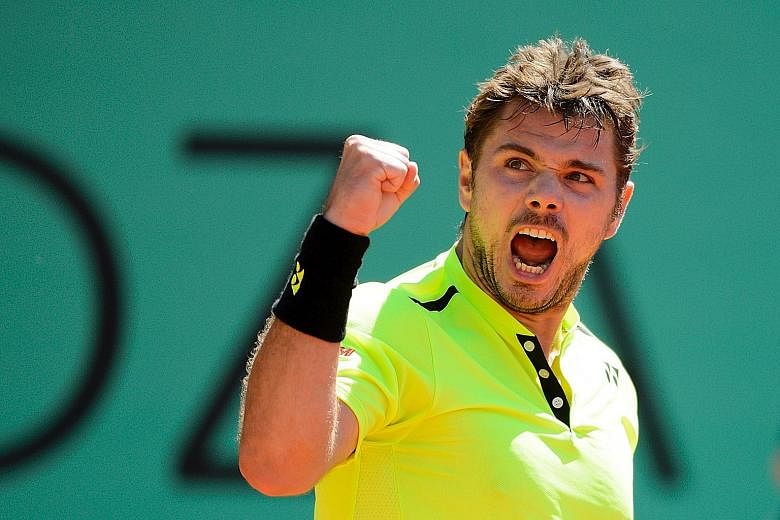ST. BARTHELEMY (Switzerland) • Entering the grounds of the Centre Social et Curatif, visitors are greeted by a gaggle of geese, ducks and chickens and a towering castle from the 11th century. On market day, a handful of its residents, adults with special needs, congregate around tables, where their vegetables, apple cider and handicrafts are for sale.
It seems an unlikely environment to produce a tennis star, and yet it was here that Stan Wawrinka, the defending French Open singles champion, was raised.
The centre is home to 75 adults with mental disabilities and is a self-sustaining facility fed by the 80-acre farm that his father, Wolfram, has run for nearly 35 years.
Wawrinka's mother, Isabelle, is in charge of the tea shop and bakery. Alongside the staff of 200, the residents work as farm hands, bakers and everything in between, while participating in activities that include gardening and woodworking.
The farm is part petting zoo, with cows, goats, alpacas and emus, and part biodynamic agricultural operation that sustains the residents and their caretakers. Wawrinka grew up riding his father's tractor and helping with the hay baling.
"I had a very happy childhood," he told the Swiss newspaper Le Matin in 2013. "I was lucky to grow up surrounded by nature and animals, to be outside all the time and to work on a big farm with my dad. By growing up at a centre for people with special needs, I learned to always fight hard to achieve what I want. In this regard, I was incredibly lucky."
Signs at both entrances of the hamlet of St Barthelemy show Wawrinka's picture and a message congratulating him on his French Open title. The town, with 680 inhabitants, is about 16km from Lausanne, but it feels a world away.
It is part of the Gros-de-Vaud, a region where 90 per cent of land is farm or forest. The Centre Social et Curatif was founded in 1946 for adults with disabilities to develop personal and professional skills and achieve autonomy and social integration.
The centre was based on anthroposophy, a philosophy developed by Rudolf Steiner that takes a holistic approach to mental health, education and agriculture. The farm follows the principles of biodynamic agriculture, also founded by Steiner in the 1920s. Wawrinka attended the Waldorf school in nearby Crissier, which encourages self-discovery and independent thinking, as envisaged by Steiner.
His tennis career was also developed through connections made at the centre. Dimitri Zavialoff, a trained social worker, also worked there. Zavialoff and his brother Gregory became friends with Wolfram and Isabelle Wawrinka.
At eight, Stan and his older brother, Jonathan, took up tennis at the local club in Echallens. Dimitri Zavialoff quickly taught himself to be a tennis coach and guided Stan until they parted ways in 2010.
Zavialoff now works with Timea Bacsinszky, a Lausanne native who reached the French Open semi-finals last year and rose to the top 10.
Gregory Zavialoff peaked at No. 623 in the ATP rankings in 1999 and served as Wawrinka's first manager. Jonathan also played professionally before becoming the head pro at the prestigious Tennis Club Stade-Lausanne.
When Stan was 15, the Zavialoff and Wawrinka brothers decided to test their fortunes in Spain. Stan turned pro at 17, and the next year, he won the French Open junior tournament and two Challenger events. St Barthelemy celebrated its home-grown champion with a parade that included a marching band and carriage ride.
"I don't take anything for granted," Wawrinka said in a 2011 interview with the French edition of Tennis Magazine. "In the beginning, my parents put a lot of money on the table so I could live my dream, without putting any pressure on us. We made our own way."
The Swiss did not break through on the Tour until the relatively advanced age of 28, when he won the Australian Open in 2014. At last year's French Open, he marched his way to the final. A significant underdog, Wawrinka blasted 60 winners in a four-set victory over Novak Djokovic.
On Saturday, Wawrinka won the Geneva Open, beating Marin Cilic 6-4, 7-6 (13-11) while playing his first final in Switzerland in 11 years. He now returns to Paris, where he will try to defend his title as the No. 3 seed.
He has many nicknames, including the Stanimal and Stan the Man. But former French player Henri Leconte may have said it best when he called Wawrinka the Bison after his French Open triumph last year.
Slightly shorter and leaner than his peers, the barrel-chested Wawrinka says his strength comes from his core and legs. He is decidedly country tough. The force he generates comes from the ground and his roots in a hamlet in rural Switzerland.
NEW YORK TIMES

